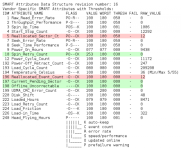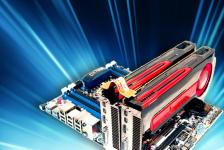On this forum you can submit full-featured reviews of your Linux-powered hardware with the help of automated reviews in the Linux Hardware Database.
Below on this page you can find notes from the author.
- Reviews — write complete reviews on your hardware (generate BBCode template first)
- Stories — write your hardware ownership/upgrade/etc stories
- Short reviews — write short reviews of your hardware here if you don't have much to say
- Everything — all other discussions
Below on this page you can find notes from the author.
The Linux Hardware Database at Linux-Hardware.org is the largest (Linux) database of hardware with 200.000+ configurations collected since 2014.
The database is grown by Linux users from all over the world with the help of hw-probe client application and dumped to our repositories on GitHub.
The database is grown by Linux users from all over the world with the help of hw-probe client application and dumped to our repositories on GitHub.
Micro Computer (HK) Tech Limited V3
HW: AMD Ryzen 7 8840U w/ Radeon 780M Graphics, AMD graphics, memory module(s) 29GB, one drive (Kingston Technology Company, Inc. OM8PGP41024Q-A0 1024GB), 14.0-inch display.
Kernel: 6.8.7-302.fsync.fc40.x86_64
PROBE ID
HW: AMD Ryzen 7 8840U w/ Radeon 780M Graphics, AMD graphics, memory module(s) 29GB, one drive (Kingston Technology Company, Inc. OM8PGP41024Q-A0 1024GB), 14.0-inch display.
Kernel: 6.8.7-302.fsync.fc40.x86_64
PROBE ID
ASUSTek Computer ROG STRIX Z790-A GAMING WIFI II
HW: Intel Core i9-14900K, Intel + Nvidia graphics, 4 memory modules (4 x Corsair CMH32GX5M2B6000C30 16GB), one drive (Samsung SSD 980 PRO 2TB S69ENF0WB47036V).
Kernel: 5.15.0-105-generic
PROBE ID
HW: Intel Core i9-14900K, Intel + Nvidia graphics, 4 memory modules (4 x Corsair CMH32GX5M2B6000C30 16GB), one drive (Samsung SSD 980 PRO 2TB S69ENF0WB47036V).
Kernel: 5.15.0-105-generic
PROBE ID
ASUSTek Computer TUF Gaming FX505DU_FX95DU
HW: AMD Ryzen 7 3750H with Radeon Vega Mobile Gfx, AMD + Nvidia graphics, memory module(s) 16GB, one drive (Intel Corporation SSD 660P Series 512GB), 15.5-inch display and 47 more devices.
Kernel: 6.8.7-1-default
PROBE ID
HW: AMD Ryzen 7 3750H with Radeon Vega Mobile Gfx, AMD + Nvidia graphics, memory module(s) 16GB, one drive (Intel Corporation SSD 660P Series 512GB), 15.5-inch display and 47 more devices.
Kernel: 6.8.7-1-default
PROBE ID
ONDA A320IPC
HW: AMD Ryzen 5 2400G with Radeon Vega Graphics, AMD graphics, memory module(s) 16GB, one drive (DERA Storage UNSPC512AKMM 512GB) and 43 more devices.
Kernel: 6.8.0-31-generic
PROBE ID
HW: AMD Ryzen 5 2400G with Radeon Vega Graphics, AMD graphics, memory module(s) 16GB, one drive (DERA Storage UNSPC512AKMM 512GB) and 43 more devices.
Kernel: 6.8.0-31-generic
PROBE ID
ALLDOCUBE i1305A
HW: Intel N95, Intel graphics, memory module(s) 16GB, one drive (MAXIO Technology (Hangzhou) Ltd. NVMe SSD Controller MAP1202 512GB), 13.5-inch display and 33 more devices.
Kernel: 6.5.0-28-generic
PROBE ID
HW: Intel N95, Intel graphics, memory module(s) 16GB, one drive (MAXIO Technology (Hangzhou) Ltd. NVMe SSD Controller MAP1202 512GB), 13.5-inch display and 33 more devices.
Kernel: 6.5.0-28-generic
PROBE ID
IGEL Technology M350C
HW: AMD Ryzen Embedded R1505G with Radeon Vega Gfx, AMD graphics, 2 memory modules (2 x RAM ST564563GEL26MS1SF 2GB).
Kernel: 6.1.0-20-amd64
PROBE ID
HW: AMD Ryzen Embedded R1505G with Radeon Vega Gfx, AMD graphics, 2 memory modules (2 x RAM ST564563GEL26MS1SF 2GB).
Kernel: 6.1.0-20-amd64
PROBE ID
Biostar G41D3B
HW: Intel Pentium Dual-Core CPU E5700, Intel graphics, one memory module (RAM Module 2GB), one drive (Seagate ST3500413AS 500GB).
Kernel: 6.1.0-20-amd64
PROBE ID
HW: Intel Pentium Dual-Core CPU E5700, Intel graphics, one memory module (RAM Module 2GB), one drive (Seagate ST3500413AS 500GB).
Kernel: 6.1.0-20-amd64
PROBE ID
We've started to highlight most important SMART attributes in computer probes, that correlate with real mechanical failures according to Google and Backblaze studies.
Green highlights the zero value of important attributes, red — any positive value ...
Green highlights the zero value of important attributes, red — any positive value ...
A new project has been created to collect the list of computer hardware devices with poor Linux compatibility based on the Linux-Hardware.org data for 4 years.
There are about 26 thousands of depersonalized hwinfo reports in the repository from computers in various configurations (different kernels, OS — mostly ROSA Fresh). The device is included into the list of poorly supported devices if there is at least one user probe in which the driver for this device was not found. The column 'Missed' indicates the percentage of such probes. If number of such probes is small, it means that the driver was already added in newer versions of the OS. In this case we show minimal version of the Linux kernel in which the driver was present.
Devices are divided into categories. For each category we calculate the ratio of poorly supported devices to the total number of devices tested in this category.
At the moment, the study is limited only to PCI and USB devices. In the future, it is planned to include the rest.
Please check the presence of known unsupported devices in the table. The device ID can be taken from the output of the 'lspci -vvnn' command in square brackets, for example [1002:9851].
There are about 26 thousands of depersonalized hwinfo reports in the repository from computers in various configurations (different kernels, OS — mostly ROSA Fresh). The device is included into the list of poorly supported devices if there is at least one user probe in which the driver for this device was not found. The column 'Missed' indicates the percentage of such probes. If number of such probes is small, it means that the driver was already added in newer versions of the OS. In this case we show minimal version of the Linux kernel in which the driver was present.
Devices are divided into categories. For each category we calculate the ratio of poorly supported devices to the total number of devices tested in this category.
At the moment, the study is limited only to PCI and USB devices. In the future, it is planned to include the rest.
Please check the presence of known unsupported devices in the table. The device ID can be taken from the output of the 'lspci -vvnn' command in square brackets, for example [1002:9851].
A new open project has been created to estimate reliability of hard drives (HDD/SSD) in real-life conditions based on the SMART data collected in the Linux-Hardware.org database. The initial data (SMART reports), analysis methods and results are publicly shared in a new GitHub repository. Everyone can contribute to the report by uploading probes of their computers by the hw-probe tool!
The primary aim of the project is to find drives with longest "power on hours" and minimal number of errors. We use the following formula as a measure of reliability: Power_On_Hours / (1 + Number_Of_Errors), i.e. time to the first error/between errors.
Please be careful when reading the results table. Pay attention not only to the rating, but also to the number of checked model samples. If rating is low, then look at the number of power-on days and number of errors occurred. New drive models will appear at the end of the rating and will move to the top in the case of long error-free operation.
You can, as before, create a probe of your computer via the application in SimpleWelcome menu or from the console by a simple command:
hw-probe -all -upload
The primary aim of the project is to find drives with longest "power on hours" and minimal number of errors. We use the following formula as a measure of reliability: Power_On_Hours / (1 + Number_Of_Errors), i.e. time to the first error/between errors.
Please be careful when reading the results table. Pay attention not only to the rating, but also to the number of checked model samples. If rating is low, then look at the number of power-on days and number of errors occurred. New drive models will appear at the end of the rating and will move to the top in the case of long error-free operation.
You can, as before, create a probe of your computer via the application in SimpleWelcome menu or from the console by a simple command:
hw-probe -all -upload




